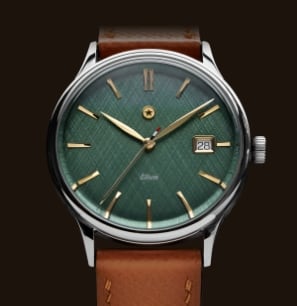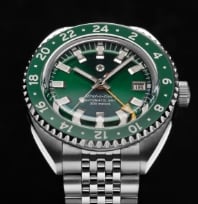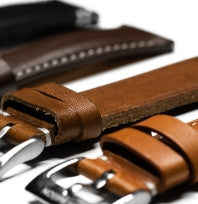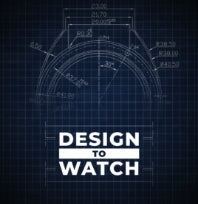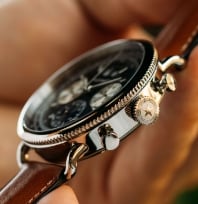Buying a luxury men's watch is an investment. If you buy something that is genuinely made with quality in mind, you will be able to pass it down for generations—to your children and grandchildren. Automatic watches are usually created to last a lifetime, but that isn’t always the case.
To understand how long automatic watches last, it’s important to first understand what an automatic watch is, how it works, and what differentiates high-quality watches from cheap ones.
What Is an Automatic Watch?
The first thing you need to know is exactly what an automatic watch is. In simple terms, an automatic watch is a watch with a mechanical movement that powers itself by using the kinetic energy you generate from swinging your arm.
What Is a Watch Movement?
Just to briefly touch on this—there are three basic types of movements in watches. These are manual, automatic, and quartz.
A quartz watch uses a quartz crystal and battery to keep time. You’ll find this in less expensive watches, and these will have a “tick” motion in the second hand. The biggest benefit of quartz watches is the price point.
Quartz is a much less expensive movement to manufacture than automatic. You’ll find these in your fast-fashion and department store watches.
Manual and automatic movements are similar. They are both mechanical watches that use mechanical elements to keep time. There is a mainspring in the watch that builds tension and slowly releases it in order to power the watch.
The difference between the two is how they store energy. In a manual watch, as the name suggests, you have to manually wind up the crown on the side of the watch in order to build that tension.
In contrast, an automatic watch does that for you through a self-winding power reserve. There is usually some kind of weight or ball bearing within the watch that moves back and forth as you move. The watch takes that energy and puts tension on the mainspring that it can release later in order to power the watch.
Are Automatic Watches Less Accurate Than Quartz Watches?
Given that quartz watches are powered on an electrical circuit and automatic are mechanical, it’s natural to wonder if it can really be as accurate. This is an ongoing debate in the watch world, but there’s nothing to worry about with a quality automatic watch.
Watchmakers have been honing their craft with automatic watches for hundreds of years, and they were making them with incredible precision and accuracy before quartz watches were even invented.
There are some cheap automatic watches that can’t keep up with quartz, but if they are of equal quality, they will both keep time perfectly fine. In fact, the best Swiss automatic watch movements that we see in Swiss army watches are sometimes better than quartz. And, not to mention, there’s just something special about a second hand that glides so smoothly around the face.
How Long Does an Automatic Watch Stay Wound?
Automatic watches have been around since the late 1700s. When they were initially invented, they could only last for a day—maybe less. Now, though, automatic watches, when fully wound, can last for days or weeks at a time without additional winding.
For an average automatic watch, you’re looking at between 40-50 hours of life. There are some that last longer, but this is typical. And for most people, that’s plenty of time.
If this is a watch that you are going to wear every day, you only need about 30 hours of wound up energy. In theory, you shouldn’t go longer than that without wearing it.
Should I Buy a Watch Winder?
This is a question we see a lot. In case you don’t know, a watch winder is a case you can place your automatic watch in that will rotate and keep the watch wound even when you aren’t wearing it.
If you're a big watch wearer with a collection of watches and plan to keep them stored for weeks at a time between wears, a watch winder can be a great investment. It will make sure that every time you want to wear a specific watch, it is wound up and ready to go.
However, if you only have one automatic watch and plan to wear it every day, your winder may sit empty more than it gets used. It really just depends on what you specifically plan to do with your watch as to whether or not you should buy a watch winder.
Can You Overwind an Automatic Watch?
Some people worry that if they move too much or wear their automatic watch too long that they may overwind it. While this is an understandable concern, it’s nothing that you should worry about.
Automatic watches have built-in features that prevent this from happening. In most, this is accomplished through what’s called a slipping spring.
Basically, as the mainspring builds tension, it gets closer and closer to this slipping point. If the mainspring gets close to being too wound up, it will slip and quickly lose a bit of tension. It will still remain close to fully wound, but this piece prevents you from overwinding and damaging the timepiece.
Will an Automatic Watch Last a Lifetime?
There is not a simple blanket answer to this question. It really depends on the quality of the watch you buy. If you get a genuinely high-quality automatic watch, it can last for hundreds of years.
When a watchmaker takes the time to put his heart and soul into creating a watch, it should last long enough for you to hand down to your children. That’s what you’re paying for with a quality watch.
However, there are some automatic watches that are made quickly and cheaply. These will not last you as long, and you may end up having to buy so many replacement watches over the years that you don’t actually save any money this way.
But, a good automatic watch doesn’t have to cost you a fortune. There are ways to determine the quality of a watch that has nothing to do with its price. In fact, a lot of what you pay for in the world of luxury watches is status and prestige rather than actual quality when it comes to things like Swiss watches, stainless steel watches, and bracelet watches.

What to Look for in an Automatic Watch?
When shopping for an automatic watch, you want to look for a few key indicators of quality. The first thing you should look at is the materials and components that the watch is made out of. Two quick things you can look at are the movements and the face of the watch.
Although all automatic watches work in functionally the same way, the internal components can have a dramatic effect on the longevity of the timepiece.
For example, at Jack Mason, we use only Swiss and Japanese watch movements—known for their quality and tendency to last a long time. We believe that a man’s watch should be able to last long enough to pass down to his children, and the components play a big role in that happening.
In addition, we use exclusively sapphire crystal for the faces of our watches. This is a synthetic material that is nearly as strong as a diamond. It is close to impossible to break, and it is nearly scratch proof.
You can get watches that have either acrylic or glass faces, but these are not nearly as high-quality as sapphire crystal. If you’re going to spend the money to buy an automatic watch, you want to get something that will last.
Why Are Automatic Watches So Expensive?
You’ll notice that most of the high-end watch companies in the world create automatic watches. It is one of the most sought-after styles of watch, and many people prefer it to any other kind.
Because of this, you’ll often see extremely high prices associated with these watches—sometimes upwards of $100,000. While some automatic watches are worth the price you pay, much of what you pay for is prestige and brand recognition.
You don’t have to spend insanely high amounts of money to get a quality automatic watch. There are plenty of watchmakers out there creating incredible watches at a fraction of the prices you may be used to.
Buy Automatic Watches at Jack Mason
At Jack Mason, we believe you should be able to get a wrist watch that represents you and will last a long time without spending thousands of dollars. Take a look at our pro diver Seamount Automatic, for example.
At only $399, it’s not even close to prices you may be used to seeing for a dive watch of its quality. With a stainless steel bracelet casing, Japanese automatic movement, and sapphire crystal, it’s an incredible timepiece. It’s also part of our Diving collection, meaning it’s tested for water resistance of up to 300 meters.
If that’s not your style, we have six unique, hand-picked collections, all designed to be a reflection of who you are and who you will become. With styles ranging from rose gold leather strap watches, automatic stainless steel dress watches, limited edition Swiss made chronograph watches, and everything in between, you are bound to find something you love. We believe you should be able to buy a high-quality, luxury timepiece at a price that you can afford.
Sources-
http://www.historyofwatch.com/watch-history/history-of-automatic-watch/
